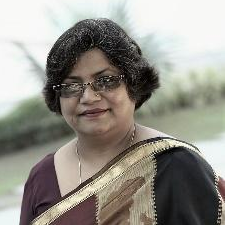
Poonam Garg
Work place: Department of Information Technology, Institute of Management & Technology, Ghaziabad, INDIA
E-mail: pgarg@imt.edu
Website:
Research Interests: Data Structures and Algorithms, Social Information Systems, Computer Architecture and Organization, Planning and Scheduling, Computer systems and computational processes, Social Computing
Biography
Dr. Poonam Garg is a Professor with Institute of Management Technology, Ghaziabad, India. She did her Ph.d in computer science in 2006 from Banasthali Vidyapeeth, Banasthali. She has 25+ years of experience in teaching, research and consulting. Her current research interests are in the areas of enterprise resource planning, social media analytics, developing heuristics and meta-heuristics particularly genetic algorithm, Tabu search and simulated annealing-based meta-heuristic for various optimization problem such as cryptanalysis of various encryption algorithms and project management. She has published many papers in different International/National journals and has ten edited books. She has served many International Conferences as a conference co-chair, conference track chair and members of program committee. She is also serving as external expert of Doctoral Research Committee for Ph.D programmes at IIS University, MLS University,Indore.
Author Articles
Horizontal Vertical Diagonal Gabor Binary Pattern Descriptor with PLDA for Pose-Invariant Face Recognition
DOI: https://doi.org/10.5815/ijigsp.2018.12.06, Pub. Date: 8 Dec. 2018
Face recognition is one of the conventional problems in computer vision. Its recognition rate falls steeply when the images are captured in an unconstrained environment. One of the fundamental issues that creep into unconstrained environment capturing is that of the face pose variation. Due to face pose variation, occlusion of crucial features takes place. Occlusion may lead to information loss in the face descriptor which describes the face appearance. In this paper, we propose learning-based descriptor that combines horizontal, vertical and diagonal pattern of blocks generated from the convolution of face image with Gabor filter bank. To use only discriminative features, Probabilistic Linear Discriminant Analysis (PLDA) is used. The fusion of non-uniform texture based descriptor along with the PLDA approach aids in retaining enough of discriminative information to overcome the information loss occurring during feature occlusion. Since HVDGBP face descriptor utilizes the fundamental concept of Linear Binary Pattern (LBP) henceforth it helped in meeting low processing demands and ease of computing characteristic required for good face descriptors. Comprehensive comparative performance analysis of the robustness of the proposed face descriptor to withstand pose variations is presented. UMIST and AT&T Database is used for experimental analysis.
[...] Read more.Other Articles
Subscribe to receive issue release notifications and newsletters from MECS Press journals